
About Us
Our Story
Outright International works together for better LGBTIQ lives.
Outright is dedicated to working with partners around the globe to strengthen the capacity of the LGBTIQ human rights movement, document and amplify human rights violations against LGBTIQ people, and advocate for inclusion and equality.
We Amplify
We see the world and are a global witness to the struggles and successes of our communities, documenting the lived realities and producing groundbreaking research. We work in partnership and ensure LGBTIQ voices are heard.
We Support
We connect activists to a growing and powerful global movement. We support activism through Strategic advice, Training, Funding, Networking, and Crisis Response.
We Advocate
We support innovative advocacy and use our collective might to carry the voices of activists to advance equality and end violence and discrimination. We drive change, power, and meaningful progress across governments, institutions, businesses, and communities.
We Celebrate
Love. Diverse identities. Expression. Progress and wins. Change.
Dedicated to the LGBTIQ human rights movement
Outright International was founded in 1990 by activist Julie Dorf, with considerable involvement from other activists, like Russian author, journalist and activist Masha Gessen. Initially called the International Gay and Lesbian Human Rights Commission, the organization aimed to eradicate the persecution, inequality and violence lesbian, gay, bisexual, transgender, intersex, and queer (LGBTIQ) people face around the world. Through the years, the geographic focus of the organization shifted to working to promote the human rights of LGBTIQ people worldwide.
Our Journey to Make An Impact
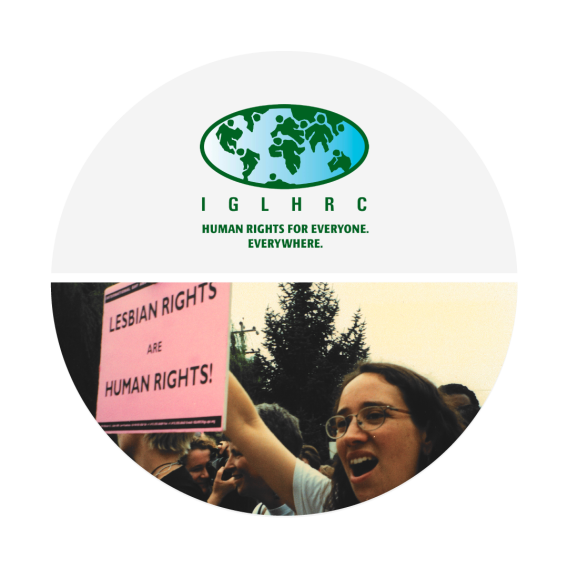
1990
A Bold Beginning: Launch of the International Gay and Lesbian Human Rights Commission
U.S. activist Julie Dorf launched what was then known as the International Gay and Lesbian Human Rights Commission (IGLHRC). In the early years, the organization focused on Russia, campaigning to decriminalize same-sex relations and end the psychiatric hospitalization of LGBTIQ people. IGLHRC also worked to bring anti-retroviral medication and condoms into the country where access to HIV/AIDS preventive measures and treatment was non-existent.
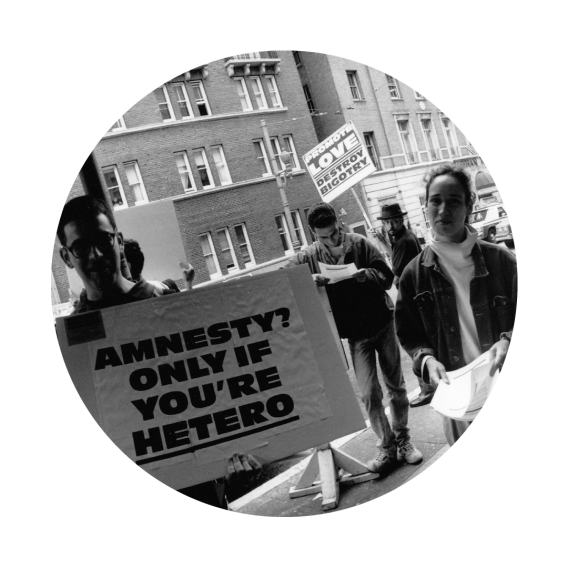
1991
Expanding Recognition: Amnesty International Adds LGBT Abuses to Its Mandate
IGLHRC campaigned to ensure that Amnesty International changed its mandate to include abuses against LGBT people.
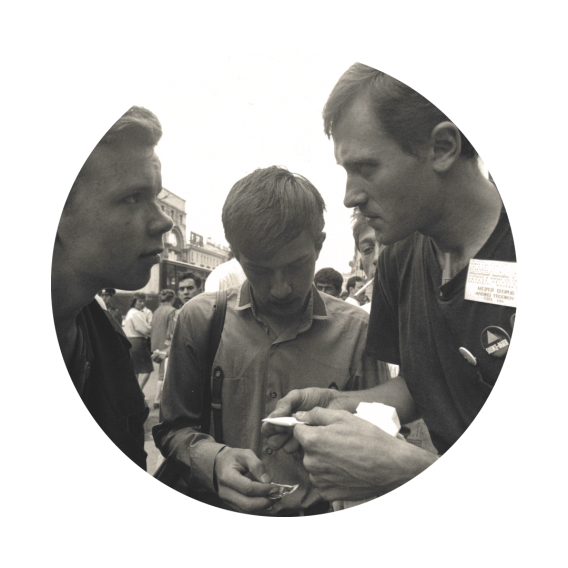
1992
Breaking Barriers: Advocacy Leads to Russia Sodomy Law Repeal Efforts
Working alongside U.S. Congressman Barney Frank, IGLHRC met with Russian officials to advocate for repealing Russia's sodomy law. These advocacy efforts proved successful, as Russia decriminalized homosexuality the following year, in 1993. Additionally, in 1992, IGLHRC notably supported a successful asylum claim for an Argentinian gay man in Canada, reflecting a growing international recognition of persecution based on sexual orientation. While not the first-ever gay asylum case globally—similar decisions had previously occurred in Germany and the Netherlands—this case underscored the increasing visibility and urgency of protecting LGBTIQ individuals worldwide.
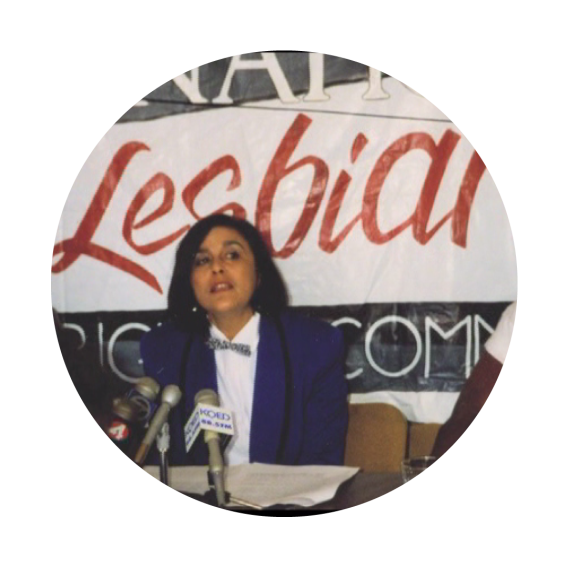
1993
Unveiling Violence: Documenting 1,200 Murders in Brazil Sparks Asylum Success
In 1993, IGLHRC's documentation of over 1,200 murders of LGBT individuals in Brazil over the preceding decade played a pivotal role in supporting the successful U.S. asylum claim of Brazilian gay man Marcelo Tenorio. This case was among the first where sexual orientation was recognized as grounds for asylum in the United States. Additionally, IGLHRC's advocacy led the U.S. State Department to include persecution based on sexual orientation in its annual Country Reports on Human Rights Practices, marking a significant advancement in international recognition of the human rights of LGBTQ people.
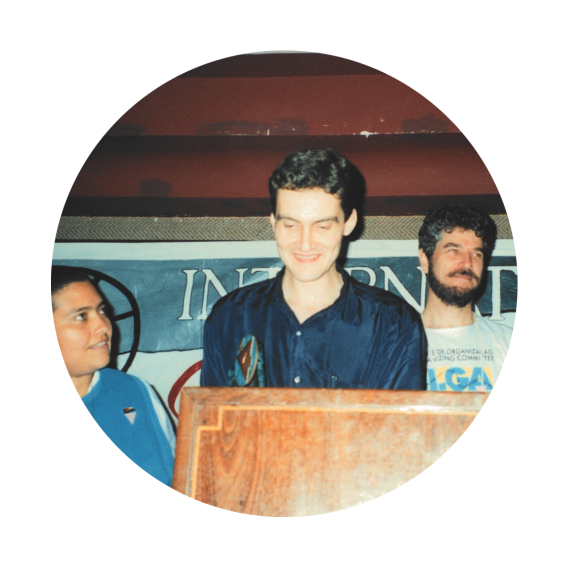
1994
Honoring Courage: Felipa de Souza Award Celebrates Resilience and Advocacy
IGLHRC launched the Felipa de Souza Award, which is named after a Brazilian woman who endured torture and exile after proudly declaring her love for another woman in the 16th century.
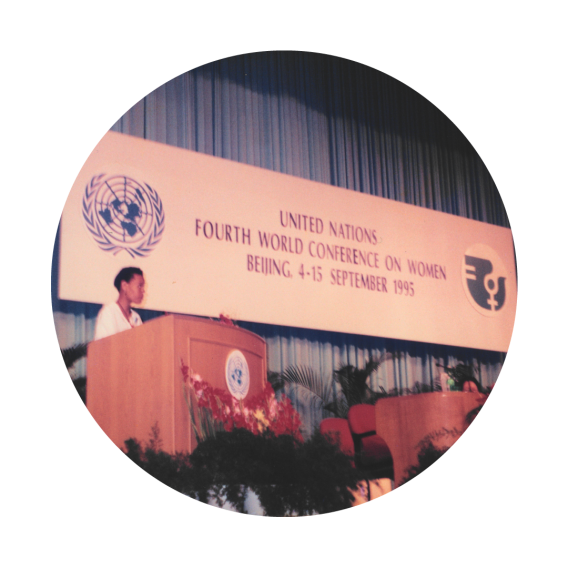
1995
The Lesbian Tent: Lesbian Rights Gain Spotlight at U.N. Women’s Conference
At the U.N. Fourth World Conference on Women in Beijing, IGLHRC helped ensure that sexual rights were part of the global agenda. The “Lesbian Tent,” a spontaneous and powerful gathering space within the NGO Forum, marked an unprecedented moment of visibility for lesbian issues. IGLHRC’s presence helped create both literal and political space for lesbian voices, sparking global solidarity and laying the groundwork for future lesbian feminist advocacy.
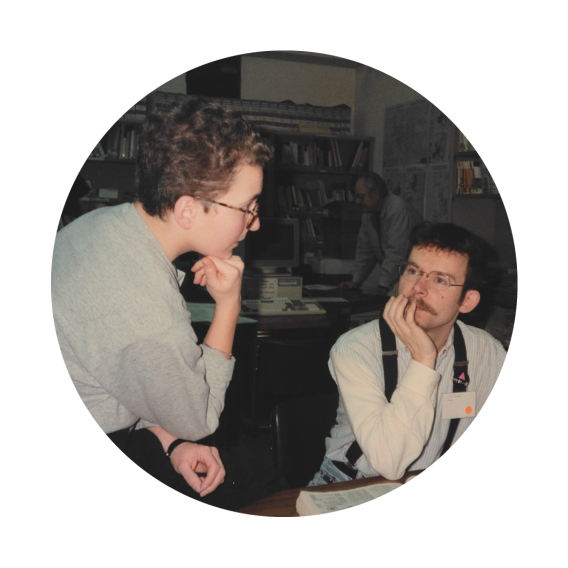
1996
Building Foundations: Expanding Regional Work and Asylum Resources
IGLHRC began regional work in Africa and the Middle East. The organization also produced its first-ever resource guide on asylum based on sexual orientation.
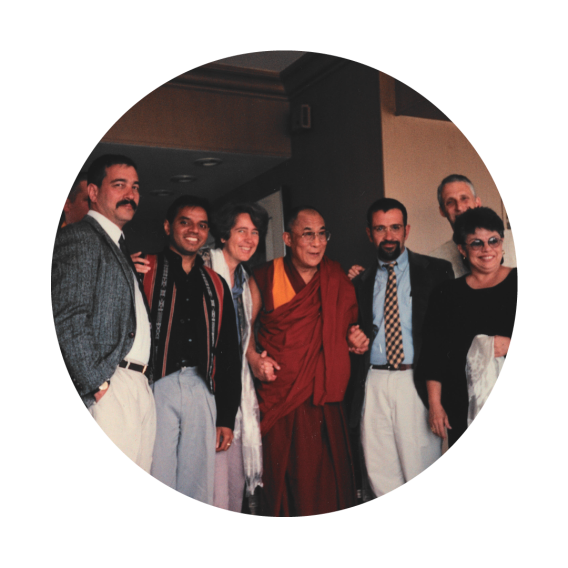
1997
Dialogue Across Borders: LGBT Leaders Meet the Dalai Lama
In South Asia, IGLHRC worked with activists to orchestrate the first meeting between LGBT community leaders and the Dalai Lama.
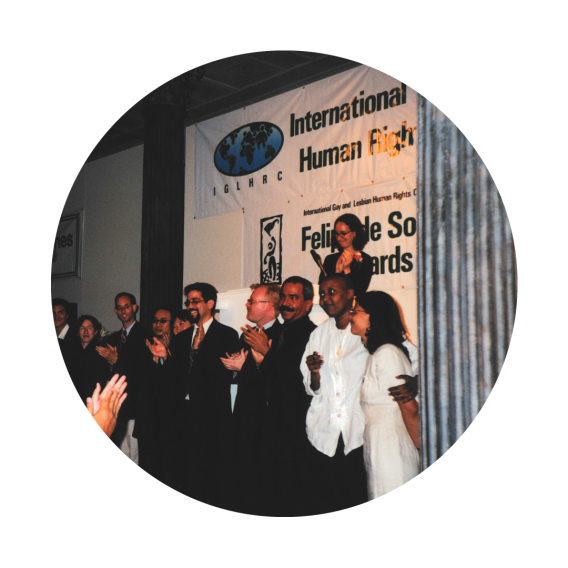
1998
Justice Achieved: Romanian President Pardons Sodomy Convictions
Through IGLHRC’s advocacy and diplomacy, the President of Romania agreed to pardon people who had been imprisoned under the country’s sodomy law. IGLHRC also conducted training for activists based in Argentina, Hong Kong, Hungary, Nicaragua, South Africa, Turkey, and Zimbabwe.
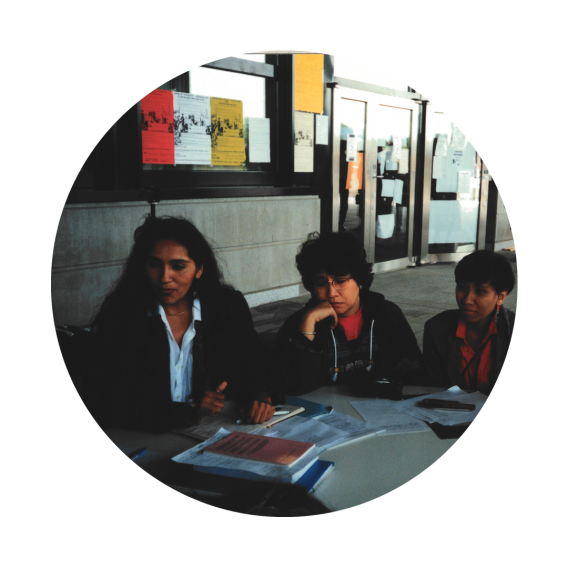
1999
Global Reach: Pro Bono Networks and Access to AIDS Medications Expand
In South Africa, IGLHRC established a network of pro bono attorneys to work on LGBTQ issues. Meanwhile, the organization increased its collaboration with activists in Korea, Japan, Taiwan, and the Philippines. IGLHRC also launched a campaign with U.S.-based activists to persuade the World Trade Organization to provide life-saving AIDS drugs to those who need them.
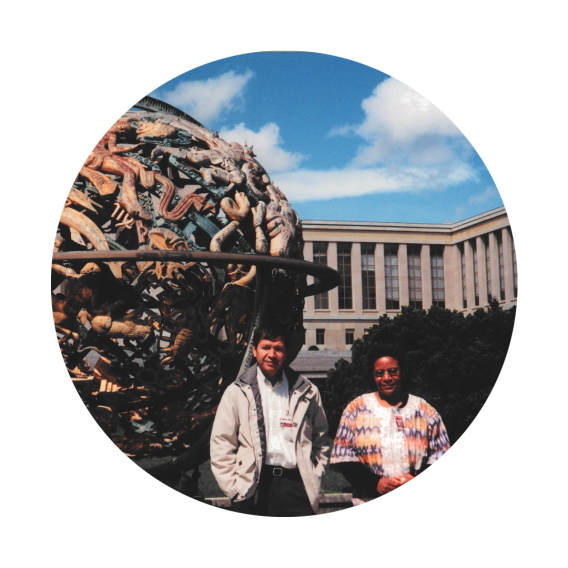
2000
In 2000, as part of the Pink Triangle Coalition, the International Gay and Lesbian Human Rights Commission (IGLHRC) convened a conference in Berlin to shed light on the Nazi persecution of homosexuals. This event aimed to honor the victims and bring international attention to this often-overlooked chapter of history. Concurrently, at a United Nations event marking the fifth anniversary of the Beijing World Conference on Women, IGLHRC published the report “Written Out: How Sexuality is Used to Attack Women's Organizing”. This publication analyzed how accusations related to sexuality are employed to undermine women's activism and organizing efforts.
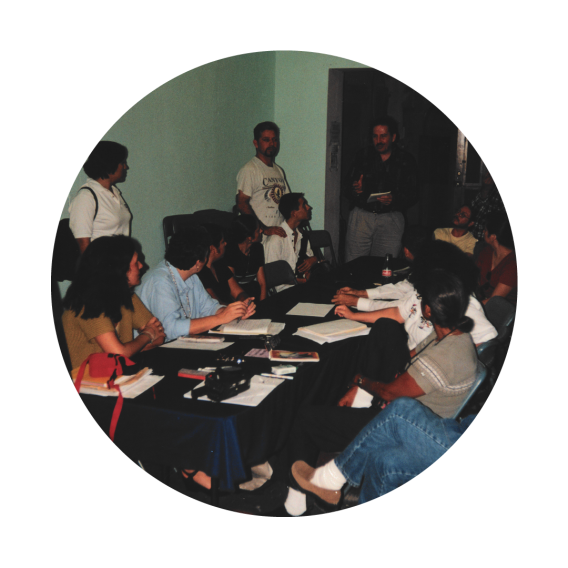
2001
I think this meeting was held in 1998
In 2000, as part of the Pink Triangle Coalition, the International Gay and Lesbian Human Rights Commission (IGLHRC) convened a conference in Berlin to shed light on the Nazi persecution of homosexuals. This event aimed to honor the victims and bring international attention to this often-overlooked chapter of history. Concurrently, at a United Nations event marking the fifth anniversary of the Beijing World Conference on Women, IGLHRC published the report “Written Out: How Sexuality is Used to Attack Women's Organizing”. This publication analyzed how accusations related to sexuality are employed to undermine women's activism and organizing efforts.
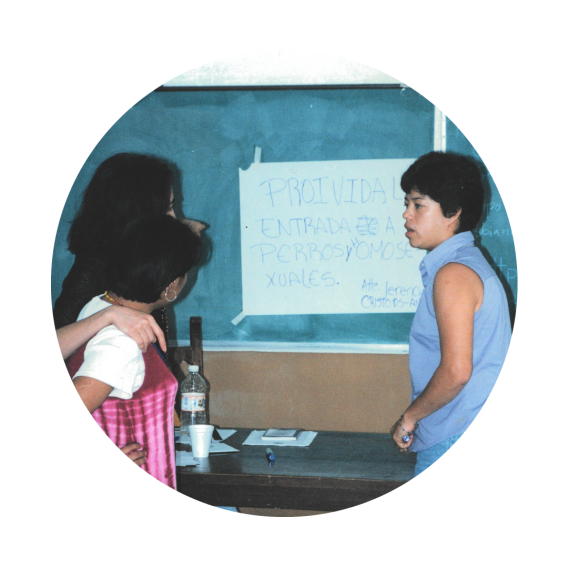
2002
Empowering Activists: Global Workshops on Harm Reduction and Advocacy
During a productive year of training, IGLHRC conducted workshops with human rights activists in India, Mexico, Paraguay, Puerto Rico, and South Africa. The organization led a workshop on harm reduction with AIDS activists in Thailand.
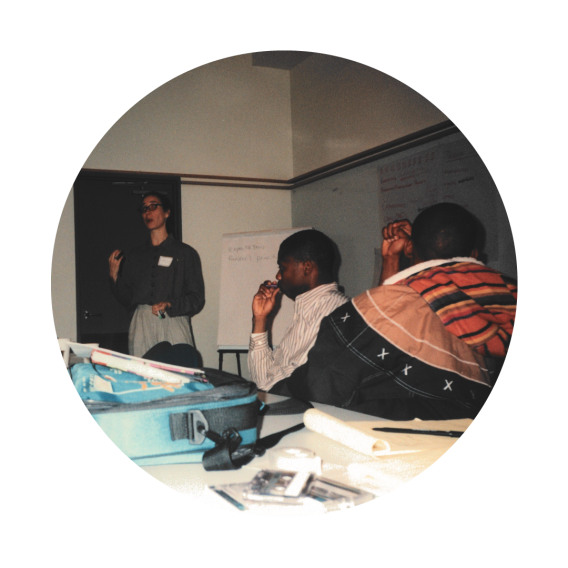
2003
State-Sponsored Homophobia: Report Highlights Systemic Abuse in Africa
IGLHRC released a report on the consequences of state-sponsored homophobia in Botswana, Namibia, South Africa, Zambia, and Zimbabwe.
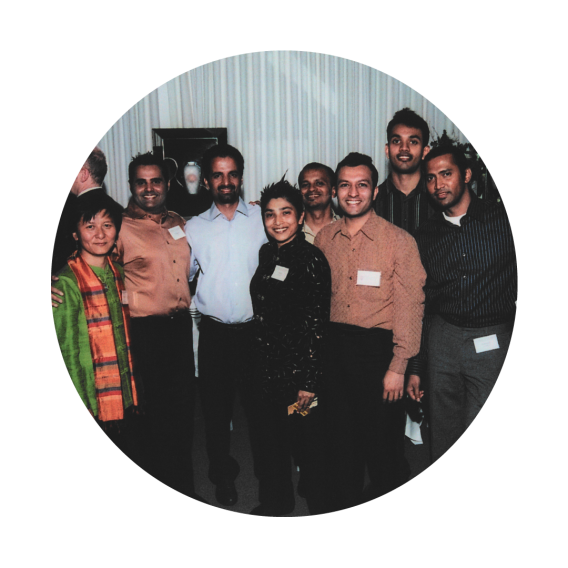
2004
Advancing Inclusion: U.N. Advocacy and Nepal’s Blue Diamond Society Gains
IGLHRC played a pivotal role in supporting Brazil's introduction of the first-ever United Nations resolution on sexual orientation and human rights at the Commission on Human Rights. Although the vote was postponed due to strong opposition, the initiative marked a historic shift, bringing the rights of LGBTIQ people into the UN's human rights discourse.
Simultaneously, IGLHRC collaborated with Nepal's Blue Diamond Society to secure the release of 39 HIV outreach workers who had been arbitrarily detained. The organization also defended Blue Diamond Society against legal challenges threatening its existence, reinforcing the rights of LGBTIQ individuals and organizations in Nepal.
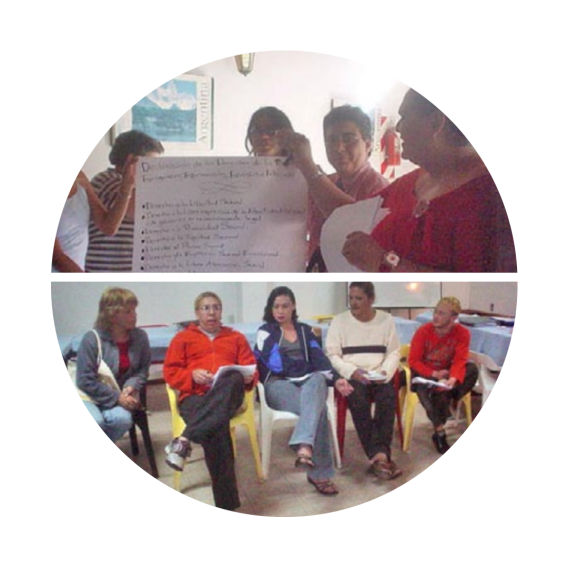
2005
Advancing Regional Movements: Launching Advocacy Institutes in Latin America
IGLHRC held its first training institute focused on trans and intersex activism, advancing regional leadership, rights-based advocacy, and a bold reimagining of gender and justice.
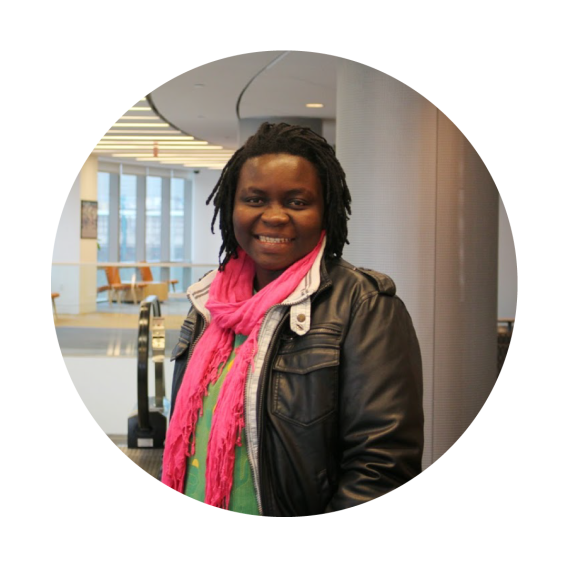
2006
Securing Freedom: Cameroon and Nigerian Activists Gain Global Support
In 2006, IGLHRC played a pivotal role in advocating for the release of 11 gay men imprisoned in Cameroon, highlighting the organization's commitment to defending the human rights of LGBTQ people in regions where such identities are criminalized. Simultaneously, in Nigeria, IGLHRC published the report "Voices of Nigeria," documenting the experiences of Nigerian LGBTQ citizens amidst governmental attempts to pass the "Same-Sex Marriage Prohibition Act." This report shed light on the challenges faced by the community and served as a critical tool in international advocacy efforts.
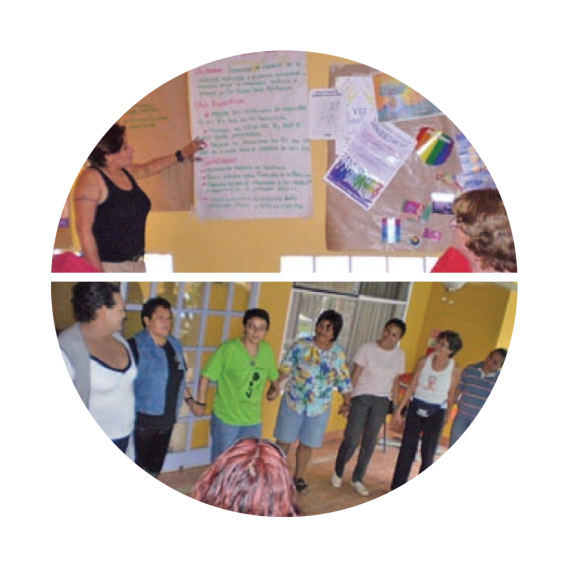
2007
Representation Matters: First LGBTIQ Delegation at African Human Rights Commission
With a focus on Central American lesbian and bisexual women and Spanish-speaking Caribbean movement leaders, IGLHRC held its second Latin American Human Rights Advocacy Institute. The organization helped bring the first-ever delegation of LGBTIQ activists to the African Commission on Human Rights and People’s Rights in Africa.
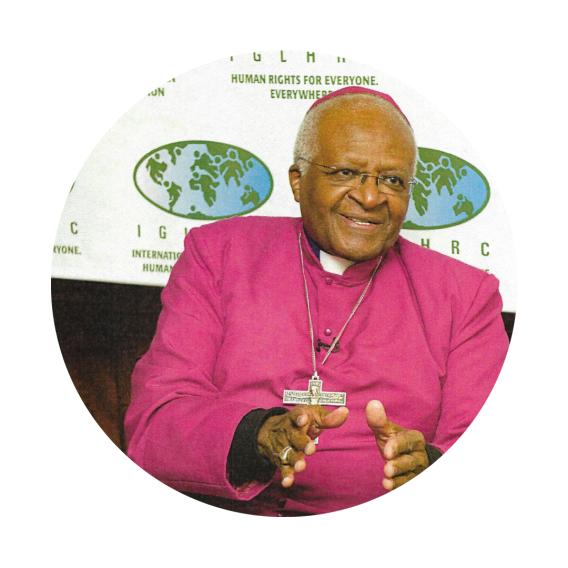
2008
Recognizing Allies: Desmond Tutu’s Apology Amplifies LGBTIQ Advocacy
IGLHRC honored Archbishop Desmond Tutu with its OutSpoken Award, marking his first direct address to a major U.S. LGBTIQ gathering. In a historic moment, he apologized on behalf of the faith community for marginalizing LGBTIQ people.
That same year, IGLHRC co-founded the United Nations Core Group, growing it from seven to 42 member states by 2023. This coalition led to the passage of the first U.N. resolution affirming LGBTIQ people’s human rights and helped establish the U.N. Independent Expert on Sexual Orientation and Gender Identity, ensuring global accountability for rights violations based on sexual orientation and gender identity.
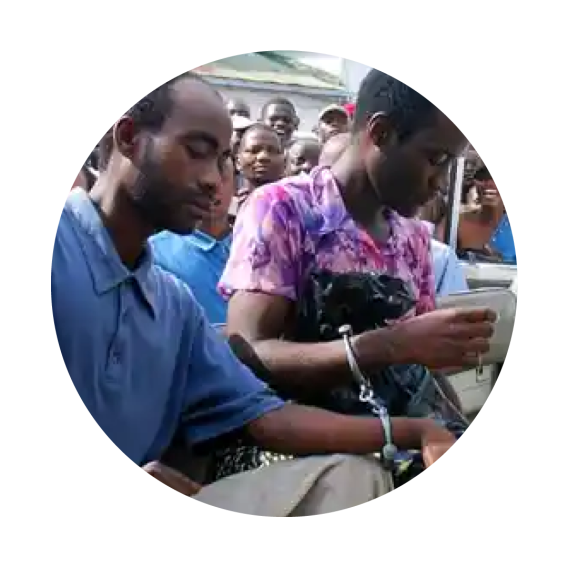
2009
Strengthening Global Partnerships: Expanding Advocacy and Support
IGLHRC continued to expand its global reach by forging new partnerships and providing technical assistance to emerging LGBTIQ movements worldwide. The organization focused on capacity-building initiatives, supporting local activists in challenging environments, and laying the groundwork for future advocacy efforts that would gain international attention in the years to come.
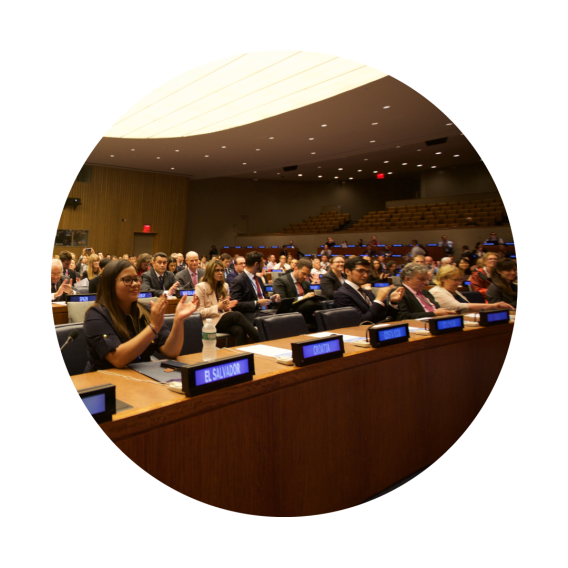
2010
Challenging Injustice: Reversing a Harsh Sentence in Malawi
In May 2010, a Malawian court sentenced Steven Monjeza and Tiwonge Chimbalanga to 14 years of hard labor under colonial-era laws criminalizing same-sex relationships. IGLHRC worked in close collaboration with Malawian activists to secure their release, including through media outreach and direct advocacy with UN officials. Their pardon later that month highlighted the power of coordinated international pressure while also underscoring the complexities of advancing rights of LGBTIQ people in diverse cultural contexts.
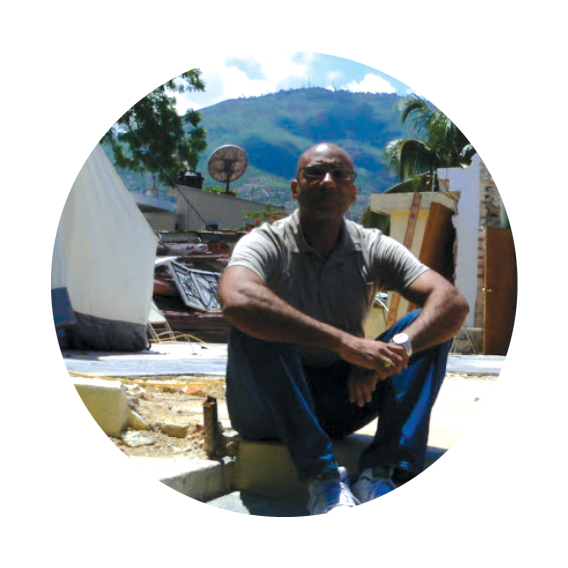
2011
A Landmark Year: U.N. Adopts First Resolution on Sexual Orientation and Gender Identity
In a landmark achievement, the United Nations Human Rights Council adopted its first-ever resolution addressing human rights violations based on sexual orientation and gender identity. IGLHRC played a pivotal role in this historic moment by engaging in strategic advocacy, collaborating with international partners, and providing critical input that helped shape the resolution's language and passage.
Concurrently, in the aftermath of Haiti's devastating 2010 earthquake, IGLHRC partnered with local organization SEROvie to document the surge in violence and discrimination against LGBTIQ individuals, particularly within displaced persons camps. Their joint report, “The Impact of the Earthquake, and Relief and Recovery Programs on Haitian LGBT People”, highlighted the unique challenges faced by the LGBTIQ communities during the relief efforts, bringing international attention to their plight and advocating for inclusive humanitarian responses.
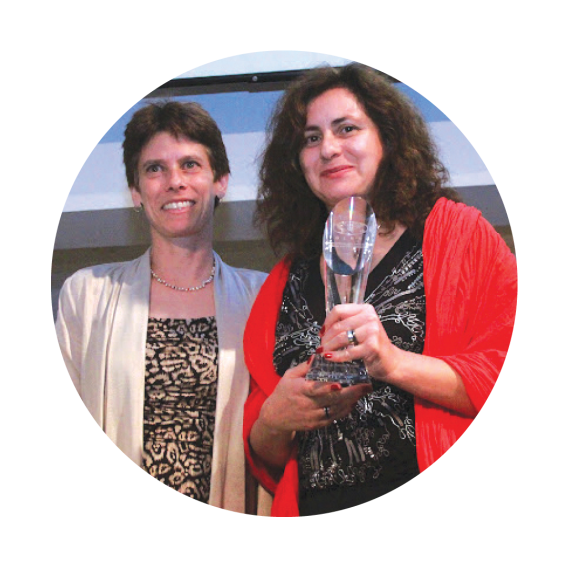
2012
Legal Milestone: Inter-American Court Condemns Chile’s Discrimination
The Inter-American Court of Human Rights ordered Chile to reverse its decision, stripping Karen Atala, a lesbian mother and judge, of custody of her three daughters based on her sexual orientation. IGLHRC co-authored an amicus brief arguing that sexual orientation and gender identity should be found to be a protected class under the American Convention on Human Rights, as held under international law.
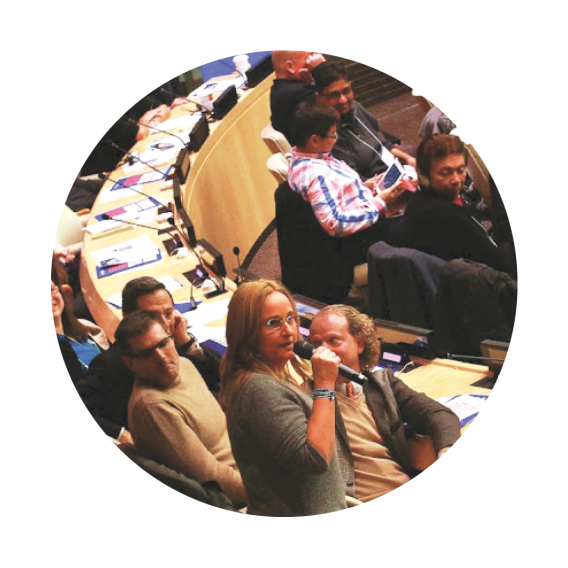
2013
Confronting Repression: Opposing Russia’s Anti-LGBTIQ Law on the Global Stage
In June 2013, Russia enacted its first federal law banning the "propaganda of non-traditional sexual relations" among minors, effectively criminalizing public discussions and expressions of LGBTIQ identities. This legislation led to a surge in arrests, the forced closure of organizations, and widespread repression, drawing international condemnation.
In response, IGLHRC co-organized a high-profile panel at the United Nations on Human Rights Day in December 2013. The event featured UN Secretary-General Ban Ki-moon, prominent athletes, and three LGBTIQ human rights defenders, aiming to spotlight the escalating homophobia and transphobia in Russia, particularly in the lead-up to the 2014 Sochi Winter Olympics. This initiative was part of IGLHRC's broader efforts to mobilize international pressure against discriminatory laws and to advocate for the rights and dignity of LGBTIQ individuals worldwide.
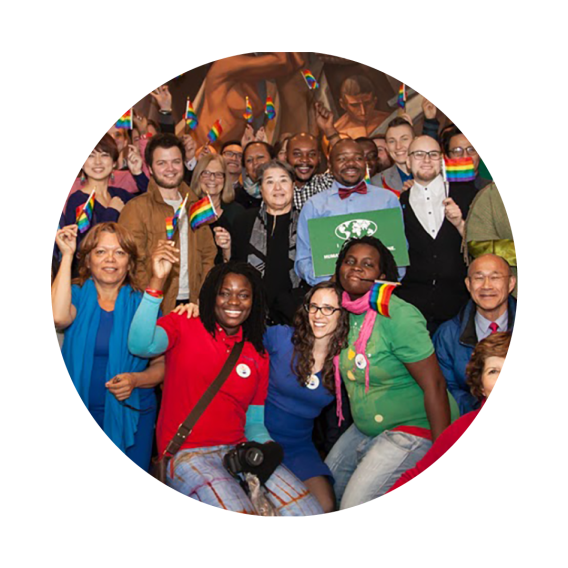
2014
Standing Strong: Advocating in Liberia, Iraq, and the Philippines
IGLHRC intensified its global advocacy efforts across multiple regions. In Liberia, the organization convened 30 activists to develop urgent protections for LGBTIQ individuals amid escalating threats. Collaborating with GALZ in Zimbabwe, IGLHRC contributed to a U.N. shadow report exposing daily discrimination against lesbian, bisexual, and transgender Zimbabweans.
In Iraq, following two years of providing humanitarian assistance to vulnerable LGBTIQ communities, IGLHRC and its partners published two landmark briefings to raise global awareness of their plight. Meanwhile, in the Philippines, IGLHRC co-authored Quezon City’s groundbreaking Gender-Fair Ordinance, a municipal non-discrimination law that became a model for broader LGBTIQ protections. These initiatives underscore IGLHRC's commitment to supporting human rights of LGBTIQ people through strategic partnerships and advocacy in diverse regions.
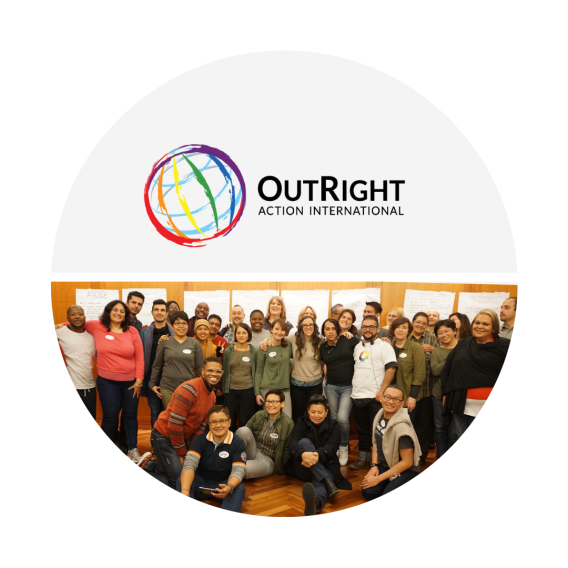
2015
A New Identity: Outright Action International is Born
In our 25th anniversary year, IGLHRC rebranded as Outright Action International. We changed our name to reflect our deep commitment to inclusion and to explicitly embrace the full spectrum of the LGBTIQ community in our mission for global human rights.
Then-Executive Director Jessica Stern made history as the first LGBTIQ advocate to address the U.N. Security Council, calling on world leaders to protect gay and bisexual men persecuted by extremists in Iraq and Syria.
That year, Outright launched its #LoveForAll campaign alongside the graphic novel "Yousef and Farhad," a powerful depiction of love and resilience in Iran.
Outright also debuted OutSummit in partnership with CUNY Law School. The inaugural event examined the evolution of the LGBTIQ movement over 25 years. Today, OutSummit remains a flagship annual conference held in honor of Human Rights Day.
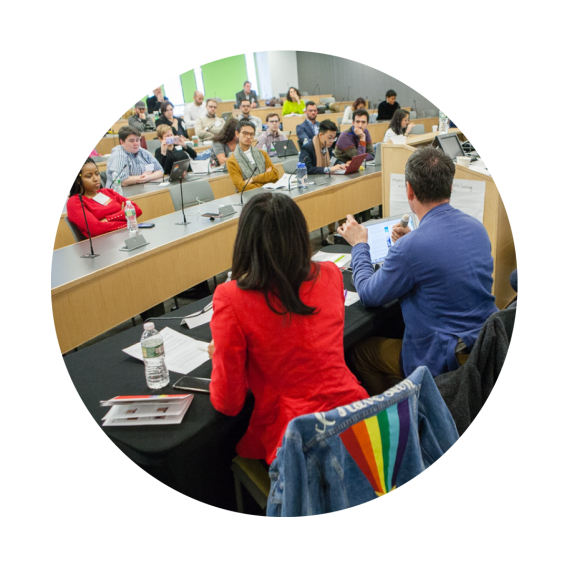
2016
Shaping the Narrative: Training Media Professionals on Gender and Sexuality in the Arab World
IGLHRC conducted pioneering research into how media across the Arab world reported on LGBTIQ issues. The findings revealed prevalent misrepresentations and a lack of nuanced understanding of media narratives. In response, IGLHRC established a comprehensive training program aimed at media professionals—including journalists, bloggers, and vloggers—focused on accurate and respectful reporting on gender and sexuality. This initiative sought to foster more informed and inclusive media coverage, contributing to greater awareness and understanding of LGBTIQ communities in the region.
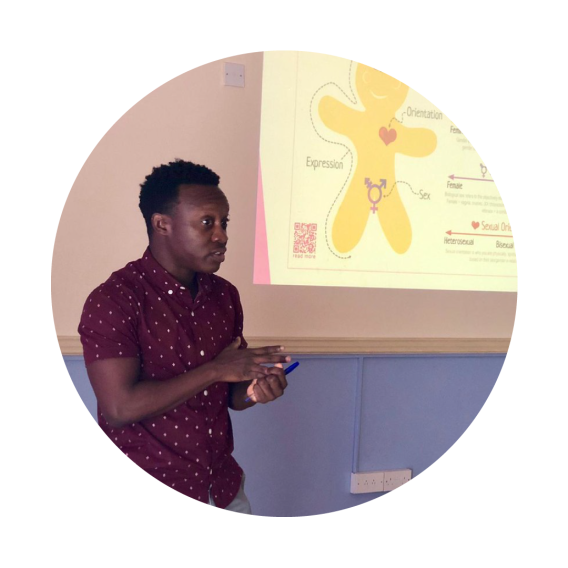
2017
Hope Amid Crisis: Supporting the Movement During Chechnya’s Purges
OutRight supported the growing LGBTIQ movement in the Caribbean by helping legally register four new organizations, including Jamaica's first trans organization. This milestone strengthened advocacy and visibility in the region. However, the year was marred by a harrowing setback in Chechnya, where authorities launched anti-gay purges involving detention, torture, and killings of men suspected of being gay or bisexual. Despite global condemnation and calls for accountability, the atrocities went entirely unpunished, underscoring the persistent threats faced by LGBTIQ communities worldwide.
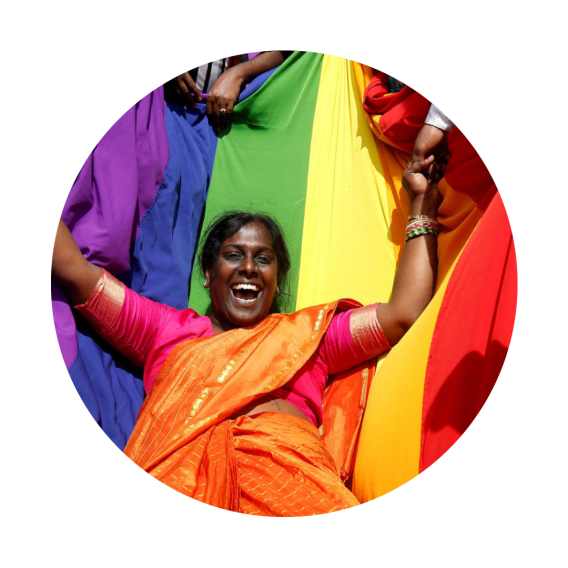
2018
A Landmark Ruling: India Decriminalizes Same-Sex Relations
India’s Supreme Court decriminalized same-sex relations in a historic decision that cited a U.N. submission authored by OutRight. Our work helped shape the legal argument for equality in the world’s second-most populous country.
In the photo, an LGBTIQ activist in Bengaluru, India, celebrates this landmark victory following the court’s verdict, which struck down Section 377, ending a colonial-era law that had long criminalized gay sex.
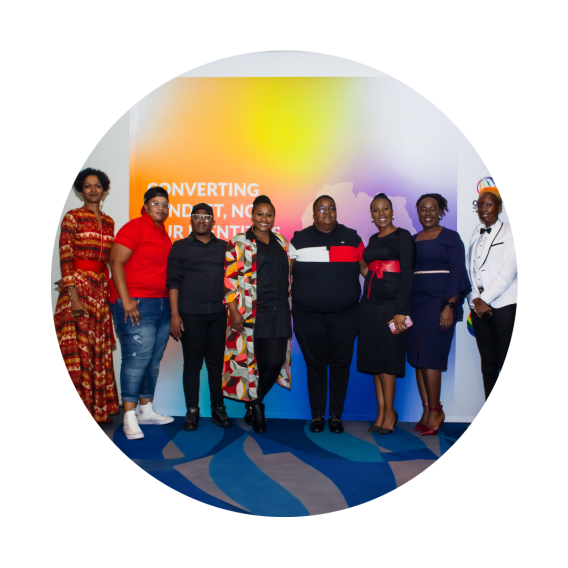
2019
Exposing Harm: Campaigning to End Conversion Therapy in Africa
Outright launched a campaign to end conversion practices in Africa, partnering with organizations in Kenya, Nigeria, and South Africa. This initiative followed the release of the first global report on so-called conversion therapy, which documented its harmful effects worldwide. The campaign aimed to raise awareness, document the prevalence of conversion practices, and advocate for their prohibition across the continent.
As part of this effort, Outright published the summary report Converting Mindsets, Not Our Identities, which presents findings from research conducted in the three partner countries. The report highlights the various forms of conversion practices and their impact on individuals and provides recommendations for ending these harmful practices.
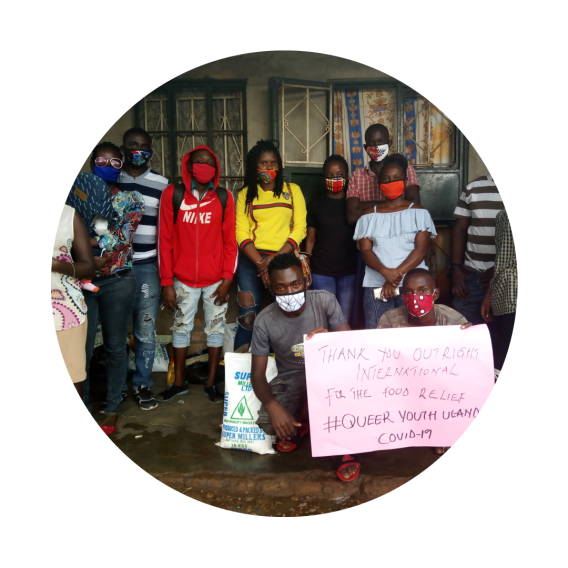
2020
Outright International Mobilizes Global COVID-19 Response for LGBTIQ Communities
Outright launched the first global LGBTIQ Emergency Fund and published a pioneering report documenting the pandemic’s impact in 38 countries. The report was featured widely and shared with governments, funders, and relief agencies to amplify LGBTIQ voices. The fund delivered $3.8 million to 355 organizations in 108 countries, reaching over 170,000 people.
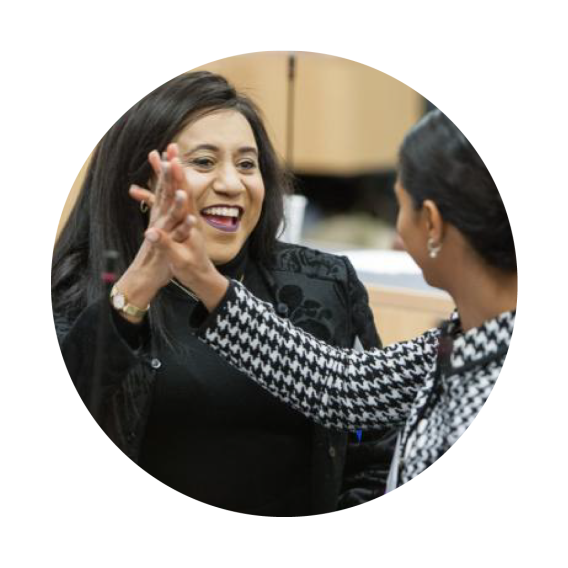
2021
Leadership and Inclusion: Launching the Global Trans Program
2021 marked a significant transition for Outright as longtime executive director Jessica Stern was appointed by U.S. President Joe Biden as the Special Envoy to Advance the Human Rights of LGBTQI+ Persons—a testament to her leadership and Outright’s global impact.
That same year, Outright deepened its commitment to trans and nonbinary inclusion by launching the Global Trans Program. The program ensures that these communities are not only recognized but prioritized. It advances trans rights through advocacy, research, and direct support for trans-led initiatives worldwide.
In its commitment to ensure that trans and nonbinary people are not only not left behind or forgotten, OutRight launched its global trans program with activist and movement leader, Rikki Nathanson.
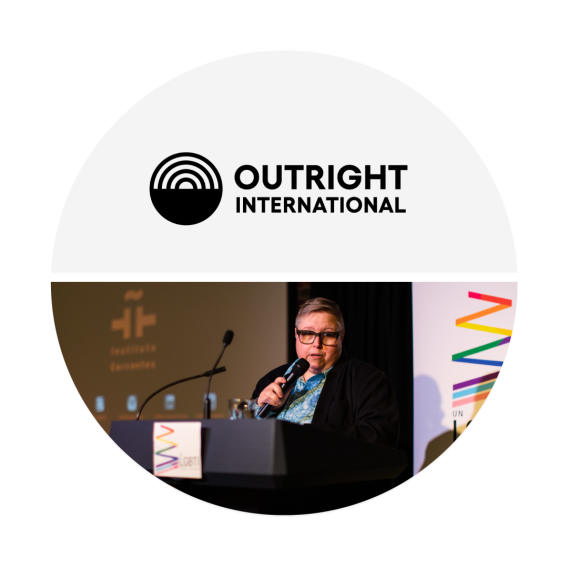
2022
Emergency Action: Supporting Ukraine and Amplifying LBQ Voices
As war broke out in Ukraine, Outright launched the Ukraine Emergency Fund to support LGBTIQ organizations providing life-saving aid.
To elevate lesbian, bisexual, and queer (LBQ) activism, we introduced LBQ Connect, focusing on learning, mentorship, grants, research, and advocacy.
This year also marked leadership and branding milestones—Maria Sjödin was appointed executive director, and we rebranded as Outright International, reaffirming our mission through four core pillars: Amplify, Advocate, Support, and Celebrate.
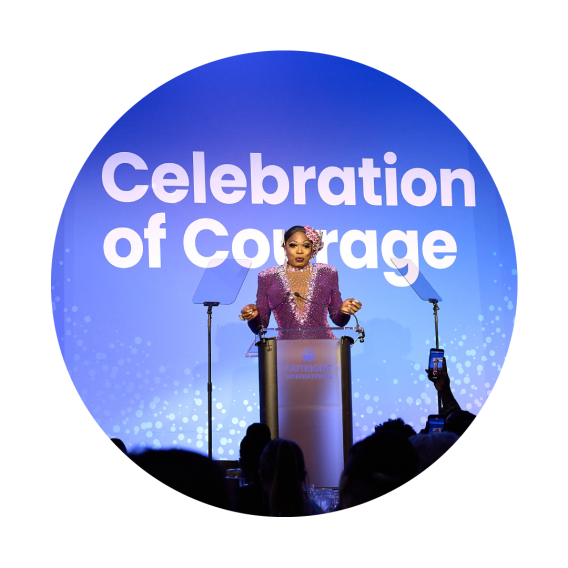
2023
Unprecedented Growth: Honoring Courage, Resisting Draconian Laws
Outright grew to 50 staff members across 16 countries, reflecting our expanding global impact. With support from Google.org, we launched our third Pride Around the World Report and an interactive map showcasing global LGBTIQ visibility events.
Yet, 2023 also brought devastating setbacks. Uganda’s Anti-Homosexuality Act imposed the death penalty for "aggravated homosexuality" and criminalized LGBTQ advocacy work. In response, Outright launched the Support LGBTQ People in Uganda Fund, providing critical resources to activists resisting this attack on human rights.
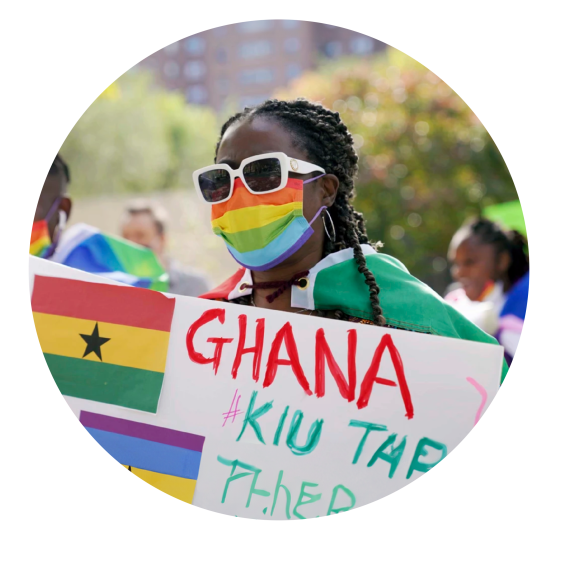
2024
Setbacks Persist: Global Anti-LGBTQ+ Laws
Amidst a global surge in anti-LGBTIQ+ legislation aimed at censoring visibility and expression, Outright International expanded its advocacy and programmatic efforts. The organization launched the Global Intersex Program to address the unique human rights challenges faced by intersex individuals, providing grants for organizational development, capacity building, research, and advocacy, including aspects related to legal and policy reform. Outright also played a pivotal role in supporting the passage of the United Nations Human Rights Council's first-ever resolution, specifically addressing discrimination, violence, and harmful practices against persons with innate variations in sex characteristics.
In the humanitarian sector, Outright co-authored the report “They Know What We Don’t: Meaningful Inclusion of LGBTIQ People in Humanitarian Action,” highlighting the importance of integrating LGBTIQ inclusion into all humanitarian planning and operations. Furthering this commitment, the organization convened a Global Consultation on LGBTIQ Inclusion in Humanitarian Action in New York City, bringing together 73 participants from over 35 countries. This consultation resulted in an Advocacy Roadmap aimed at promoting and strengthening LGBTIQ inclusion in the humanitarian sector.
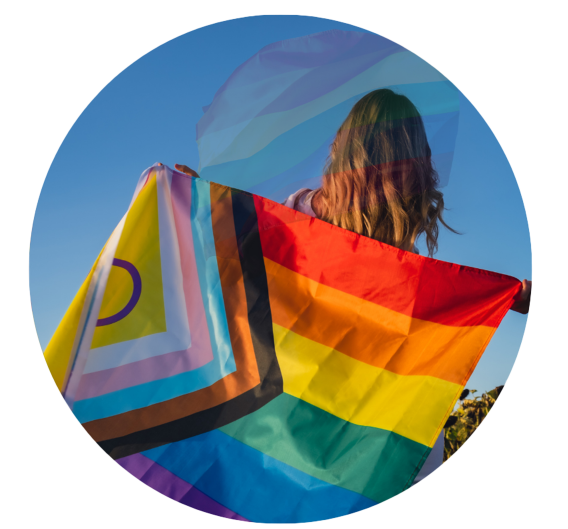
2025
35 Years of Solidarity: Advancing Equality in a Tumultuous World
As Outright marks its 35th anniversary, we reflect on more than three decades of unwavering advocacy for rights, inclusion, and equality. While challenges remain, progress continues: in January, Thailand became the 38th country to legalize same-sex marriage—a milestone for equality in Asia—and the U.S. government released a landmark report on intersex rights, underscoring the need for stronger protections.
At the same time, new threats have emerged. A wave of U.S. executive orders has denied the existence of trans and intersex people and halted federal funding for international development, disrupting critical support for Outright and LGBTIQ organizations across the globe.
In response, Outright elevated LBQ, trans, and intersex voices at the UN Commission on the Status of Women and led a protest outside the UN commemorating the historic Lesbian Tent at the 1995 Beijing Conference on Women.
Now more than ever, Outright’s mission is essential. As setbacks mount, so must our collective resistance. This is a time for action, solidarity, and resilience to defend the rights and dignity of LGBTIQ people worldwide.
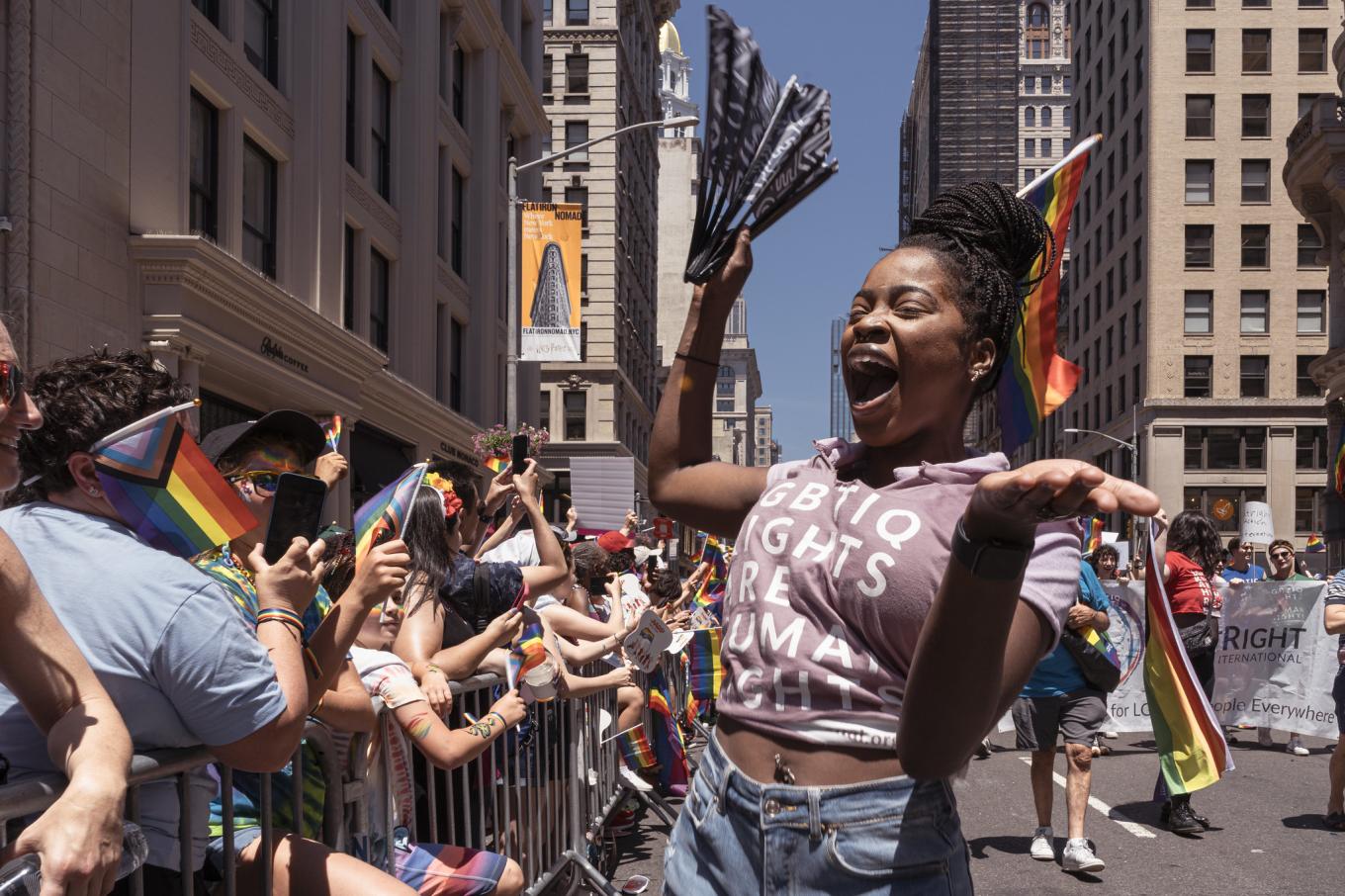
Your support makes change possible.
When you support our research, you support a growing global movement and celebrate LGBTIQ lives everywhere.
Donate Now